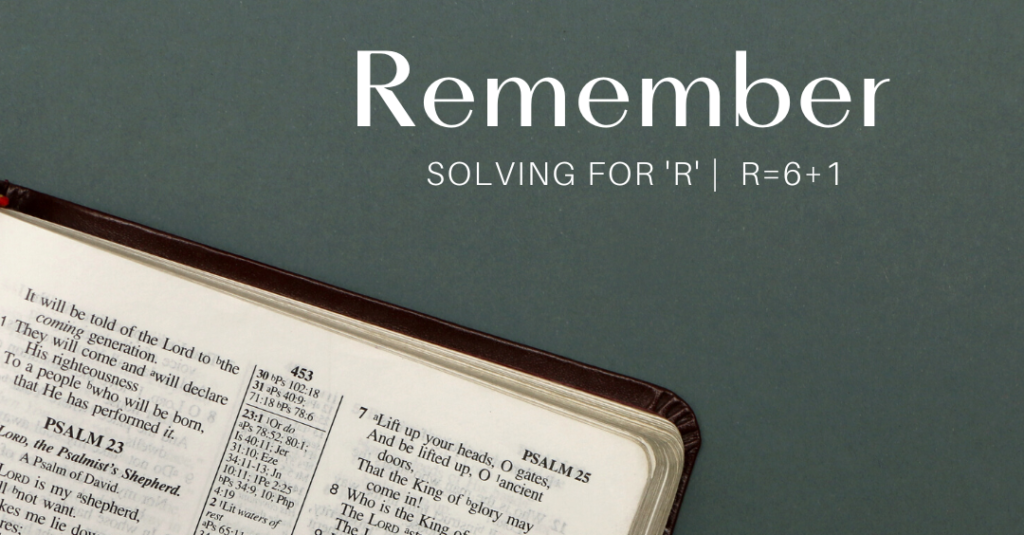
RHYTHM: Remember
Part Three in the Series
I’m a list-maker, always have been. If I don’t write something down, I tend to forget it. The most-used app on my phone is one that contains daily to-do lists. If I know I need to make a call today, purchase a birthday gift tomorrow, send a friend a note next week, or book a flight two months from now, I type it into the app linking the task to a date. As I get older, some days I need to stop to remember what day it is, but if I type something into that app, I don’t forget it. I remember!
As you may have noticed, remember is a popular theme in the Scriptures. Again and again, we’re invited to remember. And what we’re asked not to forget in the Scriptures is far more significant than remembering to send a note next week.
Our theme this year at Altar is RHYTHM. We’re exploring how daily and weekly rhythms can shape our lives. In fact, we’re suggesting the equation R = 6 + 1 is the most important equation of your life.
R = Rhythm. And the equation is one week’s living broken into two parts—6 days and 1 day. Six days to live one way and one day to live another way. Six days we work. One day we rest which the Scriptures call sabbath. To practice sabbath is simply to cease or stop one day a week. In last month’s Feeding Lanes, Eric described how ceasing is a large piece of the R = 6 + 1 way of life. On the +1 day we cease from the routines of the other six days to enjoy the gift of a different rhythm, a sabbath rhythm.
Today, we examine another piece of the R = 6 + 1 way of life: Remember.
The Ten Commandments are found in two places in the Old Testament. The first account is in Exodus when God gives the commandments to Moses on Mt. Sinai. Here is the Fourth Commandment:
Remember the sabbath day, and keep it holy. For six days you shall labor and do all your work. But the seventh day is a sabbath to the Lord your God; you shall not do any work—you, your son or your daughter, your male or female slave, your livestock, or the alien resident in your towns. For in six days the Lord made heaven and earth, the sea, and all that is in them, but rested the seventh day; therefore the Lord blessed the sabbath day and consecrated it.
Exodus 20:8-11 (NRSV)
The second place the Ten Commandments are found is in Deuteronomy. By now, the people of God are far along on their long trek to the Promised Land. As their journey continues, Moses reminds them of the commandments God gave them. Here is the Fourth Commandment as it is found in Deuteronomy:
Observe the sabbath day and keep it holy, as the Lord your God commanded you. For six days you shall labor and do all your work. But the seventh day is a sabbath to the Lord your God; you shall not do any work—you, or your son or your daughter, or your male or female slave, or your ox or your donkey, or any of your livestock, or the resident alien in your towns, so that your male and female slave may rest as well as you. Remember that you were a slave in the land of Egypt, and the Lord your God brought you out from there with a mighty hand and an outstretched arm; therefore the Lord your God commanded you to keep the sabbath day.
Deuteronomy 5:12-15 (NRSV)
In both listings of the Ten Commandments, the word remember is used once—interestingly, in each list, remember is used in the Fourth Commandment. However, notice how the word is used differently in the passages.
In Exodus, God’s people are commanded to “remember the sabbath day”—they were not to forget to rest one day in seven. Their lives were to be lived in a rhythm, R = 6 + 1. And that’s what they did. The +1 day became so much a part of their way of life that many centuries later the events of Holy Week were shaped by that rhythm—the disciples couldn’t take care of Jesus’ body the day after he died because it was the sabbath day.
By contrast, in Deuteronomy’s listing of the Ten Commandments, God’s people are commanded to remember that they were slaves in Egypt and how God delivered them from that horrible way of life. There was no such thing as a +1 day in Egypt—a day to cease once a week from the routines of the other six days was not part of their existence back then. But now it could be. And on the sabbath day, they were not to forget how life once was and how God was faithful to deliver them.
Remember was a key piece of keeping sabbath in Old Testament times.
How is remember a key piece of a +1 day in our time?
First, like God’s people of old, we are to remember the sabbath day, to not forget to rest one day in seven. If we’re new to the practice of a +1 day, we may need to put it on a weekly to-do list so we don’t forget! So many of us lead lives of such fast pace that slowing down one day in seven will require some intentionality. A +1 day doesn’t happen by accident.
Second, on the sabbath, we remember who we are. I like the way Ruth Haley Barton puts it:
Taking our cues from Moses, we see that one of the main functions of sabbath-keeping is to give us a regular, built-in opportunity for remembering who we are and to whom we belong. No matter how enslaved we’ve been during the week, on the sabbath we remember our true identity as free people. (from Embracing Rhythms of Work and Rest)
On the sabbath, our +1 day, we remember that above all the stresses and strains and struggles of life, we belong to a God who loves us, a God who is ever faithful. We can never remember this truth enough. When we practice R = 6 + 1, we will remember this truth at least once a week.
I invite you to continue a theme that has always been part of life for God’s people. Remember. Remember to keep sabbath and on that +1 day remember that you belong to God. Don’t forget the many ways he has been faithful to you. Remember is such a popular theme in the Scriptures because it is life-giving. And don’t you forget it!
For Reflection and Application
- Take a moment now to remember this: You are a child of God. You belong to him. How does remembering this today give meaning to your current life circumstances?
- Have you considered how you might live into R = 6 + 1? What would it require for you to live in this rhythm?
- Remember a time in your life when God was faithful to you. Perhaps the memory will be of something that occurred this past week, or perhaps a memory from years ago will surface. What affect does that memory of God’s faithfulness have for you in this moment?
We are just getting started. We have four more months of building our R = 6 + 1 theme in our Feeding Lanes devotions, so please stay tuned, keep reading, or attend an Altar Retreat this year where we are dedicating our teaching to helping people experience and begin living in rhythm.
Steve Ebling | April 2023


